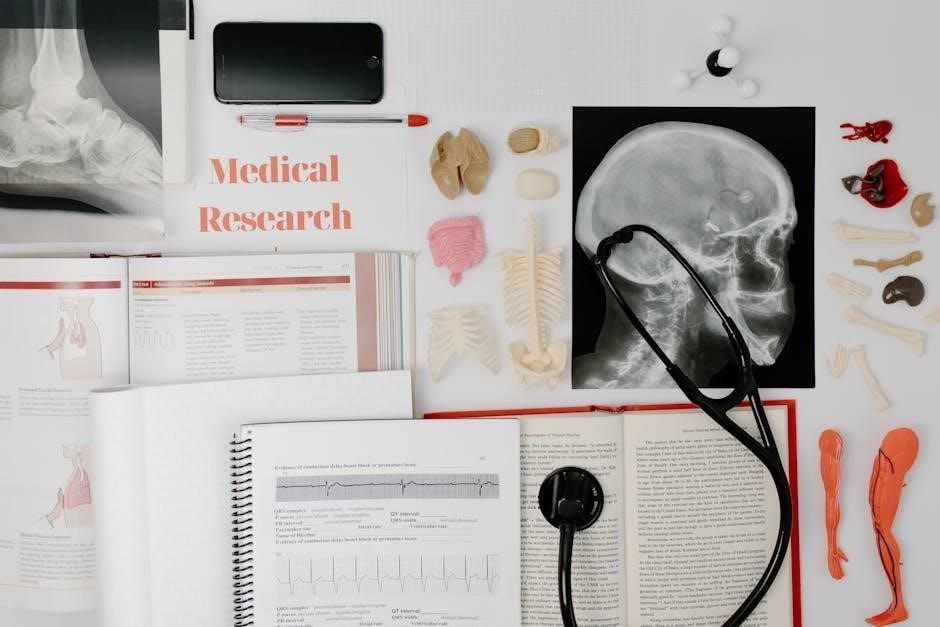Welcome to the Chemistry Final Exam Study Guide! This comprehensive resource covers key concepts like atomic structure, chemical reactions, and stoichiometry. Practice problems and effective study strategies are included to ensure thorough preparation for your exam. Master these topics and approach your final with confidence!
1.1. Overview of the Exam Format and Content
The chemistry final exam assesses understanding of core concepts, including atomic structure, chemical reactions, stoichiometry, and thermodynamics. The exam typically features multiple-choice questions, short answers, and problem-solving sections. Emphasis is placed on applying theoretical knowledge to practical scenarios. Students should expect questions that test comprehension of key principles and the ability to analyze data. Familiarity with laboratory procedures and the periodic table is also crucial. Regular practice with sample problems ensures readiness for the exam’s format and content.
1.2. Importance of Preparation and Time Management
Preparation and time management are crucial for success in the chemistry final exam. Consistent practice and regular review of key concepts ensure a strong foundation. Allocate specific times daily for focused study, avoiding cramming. Organize your schedule to cover all topics systematically. Effective time management during study sessions and the exam itself prevents stress and enhances performance. Prioritize understanding over memorization, as grasping principles is essential for solving complex problems. Dedicate time to practice problems and review weak areas to build confidence and readiness for the exam.

Key Chemistry Concepts to Master
Mastering atomic structure, chemical reactions, stoichiometry, and gas laws is essential for exam success. These key concepts form the foundation of chemistry and problem-solving skills.
2.1. Atomic Structure and the Periodic Table
Understanding atomic structure and the periodic table is fundamental. Focus on electron configurations, periodic trends, and how elements are organized by atomic number. Key concepts include ion formation, valency, and chemical properties. Regular practice with diagrams and charts will help you identify relationships between elements. This foundation is crucial for mastering chemical reactions and stoichiometry. Ensure you can explain why elements exhibit specific behaviors based on their position in the periodic table.
2.2. Chemical Reactions and Stoichiometry
Mastery of chemical reactions and stoichiometry is essential for success. Focus on balancing equations, calculating moles, and understanding reaction types. Key concepts include limiting reagents, percent yield, and chemical equilibrium. Practice solving problems to grasp the relationships between reactants and products. Understanding the why behind each step ensures proper application in complex scenarios. Regular practice with stoichiometric calculations and real-world examples will solidify your understanding and enhance problem-solving skills.
2.3. Gas Laws and Thermodynamics
Gas laws and thermodynamics are fundamental concepts that govern the behavior of matter and energy. Focus on understanding Boyle’s Law, Charles’s Law, and the Ideal Gas Law. Practice calculating pressure, volume, and temperature relationships. Thermodynamics introduces the laws of energy conservation and entropy changes. Mastering these concepts involves solving problem sets that apply mathematical formulas to real-world scenarios. Regular practice ensures fluency in interpreting gas behavior and energy transformations, which are critical for advanced chemistry topics. Relate these principles to practical examples to reinforce your understanding.

Effective Study Strategies
Effective study strategies are essential for mastering chemistry. Active recall and spaced repetition are key techniques. Flashcards help memorize vocabulary and formulas. Group study and teaching others reinforce understanding. Regular problem-solving builds confidence and fluency.
3.1. Active Recall and Spaced Repetition
Active recall and spaced repetition are powerful tools for retaining chemistry concepts. Test yourself regularly on key topics like atomic structure and reactions without notes; Use flashcards to quiz formulas and terms. Spread study sessions over time to avoid cramming. This strengthens memory and improves long-term retention. Consistent practice ensures concepts are well-understood and easily recalled during exams. These methods enhance problem-solving skills and build confidence. Implement them in your study routine for optimal results.
3.2. Using Flashcards for Vocabulary and Formulas
Flashcards are an excellent tool for mastering chemistry vocabulary and formulas. Write key terms on one side and definitions or equations on the other. Regularly review them to reinforce memory. Use flashcards to focus on essential concepts like the periodic table and stoichiometry. This method helps in quick recall during exams. You can also digitalize them for convenience. Consistent use ensures familiarity with critical terms and formulas, making problem-solving more efficient. Incorporate flashcards into your daily study routine for effective learning and retention of chemistry fundamentals.
3.3. Group Study and Peer Teaching
Group study and peer teaching are powerful strategies for understanding complex chemistry concepts. Collaborating with classmates allows you to discuss challenging topics, clarify doubts, and share insights. Teaching others reinforces your own knowledge, as explaining concepts strengthens retention. Use flashcards or practice problems to test each other’s understanding. Group study fosters a collaborative environment, making learning interactive and engaging. It also helps identify weak areas and builds confidence. Regular group sessions can significantly enhance your preparation and overall performance in the chemistry final exam.

Practice Problems and Problem-Solving Skills
Mastering practice problems enhances problem-solving skills, ensuring a deep understanding of chemistry concepts. Regular practice helps apply theories to real-world scenarios, building exam confidence.

4.1. Working Through Practice Problems
Working through practice problems is essential for mastering chemistry concepts. Regularly solving problems helps develop problem-solving skills, clarifies doubts, and builds confidence. Start with basic problems to grasp fundamentals, then progress to more complex ones. Use practice sets to apply theoretical knowledge to real-world scenarios. Review solutions thoroughly, ensuring understanding of each step. Consistent practice strengthens your ability to tackle various question types, preparing you for the final exam effectively.
4.2. Understanding Why Behind Each Step
Understanding the reasoning behind each step in a problem is crucial for deep learning. Instead of memorizing solutions, focus on grasping the underlying principles and concepts. Ask yourself why each step is necessary and how it contributes to the solution. This approach enhances problem-solving skills and ensures you can apply concepts to new scenarios. Regularly reviewing and explaining steps aloud or to peers reinforces understanding. This method also helps identify areas where additional practice or review is needed, solidifying your grasp of chemistry fundamentals.
4.3. Applying Concepts to Real-World Scenarios
Applying chemistry concepts to real-world scenarios enhances understanding and retention. Relate textbook principles to everyday examples, such as chemical reactions in cooking or environmental processes. This method bridges theory and practice, making learning more engaging. By connecting concepts to tangible situations, students develop problem-solving skills and a deeper appreciation for chemistry’s role in the world. Regularly exploring real-world applications ensures that knowledge is not just memorized but actively used, preparing students for practical challenges both in exams and beyond.

Exam Day Tips and Tricks
Arrive early, stay calm, and read questions carefully. Use elimination for multiple-choice and review answers if time allows. Manage your time wisely to complete all sections.
5.1. Reading Questions Carefully
Reading questions thoroughly is crucial for exam success. Identify key terms and instructions to guide your approach. Highlight important details to avoid misunderstandings. Take a moment to ensure you grasp what is being asked before jumping to the answer. This step prevents errors and saves time, allowing you to tackle each question confidently and accurately. By being attentive, you can address the question fully and earn the highest possible score.
5.2. Managing Time During the Exam
Efficient time management is vital during the chemistry final exam. Allocate a specific time to each question based on its difficulty and point value. Start with easier questions to secure early points, then move to more challenging ones. Use practice problems to improve your speed and accuracy. If stuck, skip the question and return later to avoid wasting time. Leave a few minutes at the end to review your answers and ensure all questions are attempted. Proper time management reduces stress and maximizes your score.
5.3. Staying Calm and Focused
Staying calm and focused during the chemistry final exam is crucial for optimal performance. Begin by taking deep breaths to reduce anxiety and maintain a positive mindset. Regular practice and understanding of key concepts beforehand will boost confidence. If you feel overwhelmed, pause for a moment, and refocus on the task at hand. Avoid rushing through questions—take your time to read and analyze each carefully. Remember, a clear mind and steady approach will help you tackle even the most challenging problems effectively.

Additional Resources for Success
Supplement your studies with recommended textbooks and online guides. Join study groups or seek tutoring for personalized support. Utilize office hours and digital tools to reinforce learning and stay ahead.
6.1. Recommended Textbooks and Online Guides
Textbooks like “Chemistry: The Central Science” and “Principles of Modern Chemistry” offer in-depth explanations of key concepts; Online guides, such as Khan Academy and Coursera, provide interactive lessons and practice problems. Websites like Chemistry LibreTexts and OpenStax offer free, comprehensive resources. Utilize these materials to reinforce your understanding of topics like stoichiometry, gas laws, and thermodynamics. Supplementing your studies with these resources ensures a well-rounded preparation for your final exam.
6.2. Utilizing Study Groups and Tutors
Study groups and tutors are excellent resources for mastering chemistry concepts. Collaborating with peers in study groups fosters interactive learning, allowing you to quiz each other and discuss confusing topics. Tutors provide one-on-one guidance, helping to clarify complex ideas like stoichiometry or thermodynamics. Many schools offer free tutoring services, while online platforms like Chegg Tutors or Varsity Tutors connect you with experts. Additionally, study groups can review practice problems together, reinforcing problem-solving skills. Make the most of these resources by preparing specific questions or areas of focus to maximize your learning experience.
6.3. Taking Advantage of Office Hours
Office hours are a valuable resource for clarifying doubts and deepening your understanding of chemistry concepts. Instructors are available to discuss topics like chemical reactions, stoichiometry, and thermodynamics. Prepare specific questions or problems to ensure productive discussions. This personalized guidance helps address weak areas and provides insights into exam strategies. Regular attendance at office hours fosters a stronger connection with the material and enhances problem-solving skills, making you more confident for the final exam. Don’t hesitate to utilize this support system to achieve academic success.

Final Review and Assessment
Conduct a thorough review of all chemistry concepts, focusing on weak areas. Simulate exam conditions to test readiness. Regular self-assessment ensures a strong foundation for success.
7.1. Conducting a Comprehensive Review
A comprehensive review is essential for identifying strengths and weaknesses. Organize your notes, summaries, and practice problems into key topics like atomic structure and thermodynamics. Use flashcards to reinforce vocabulary and formulas. Regularly test yourself with practice exams to simulate exam conditions. Focus on understanding concepts rather than memorizing steps. Reviewing consistently ensures a solid grasp of the material, helping you approach the final exam with confidence and clarity.
7.2. Identifying and Focusing on Weak Areas
Identify weak areas by reviewing practice problems and past assessments. Focus on topics where you consistently struggle, such as stoichiometry or thermodynamics. Create flashcards for challenging concepts and dedicate extra study time to these areas. Seek help from instructors or study groups to clarify doubts. Regularly test your understanding through targeted practice problems. By addressing weaknesses early, you can build a stronger foundation and approach the exam with confidence, ensuring no gaps in your knowledge.
7.3. Simulating Exam Conditions

Simulating exam conditions helps build stamina and mental readiness. Set a timer for the exam duration and work through practice problems in a quiet, distraction-free environment. Use actual exam questions or past papers to mimic the real test experience. Review your results to identify areas needing improvement. This practice reduces anxiety and enhances problem-solving skills under pressure. Regular simulation strengthens your ability to manage time and stay focused, ensuring you’re fully prepared for the actual exam day.